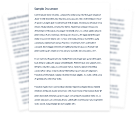Modern Slavery Policy
Create your quality document of Modern Slavery Policy with Lawpath’s instant document builder which encompasses human trafficking, forced labour. Draft yours now!
4.5 (25 reviews)
Last updated November 18, 2025
Under 5 minutes
Suitable for Australia
Written by Edwin Montoya Zorrilla
Reviewed by Damin Murdock
Document Overview
What Is Modern Slavery?
Modern slavery is an umbrella term which encompasses human trafficking, forced labour or any sort of exploitation. In the workforce, modern slavery does not include underpayment of workers or being negligent. Modern slavery has relevance to companies as businesses have a role in ensuring their practices do not adhere or support modern slavery.
What Is A Modern Slavery Policy?
A modern slavery policy is a document which outlines a company’s position in regards to preventing modern slavery and its processes for identifying and dealing with instances of modern slavery.
The Modern Slavery Act 2018 (Cth) is to make specific Australian companies provide annual reports on the risks of modern slavery within their businesses. Any business in Australia may be subject to modern slavery and in response, it is integral for businesses to develop a modern day slavery policy which outlines how the business’s practices will not contribute to modern day slavery.
Does Your Small Business Need a Modern Slavery Policy?
Small businesses in Australia are not required to make a modern slavery policy. However, ensuring that your business’s suppliers do not engage in modern slavery is important.
The Attorney-General defines that modern slavery reporting is only a legal requirement to entities in Australia who have a consolidated revenue of at least $100 million dollars.
However, with the rise of corporate social responsibility and consumers boycotting organisations that discard the triple bottom line, it is recommended to develop a modern slavery policy to ensure consumers are aware of your business practices ethically and avoid engaging in modern slavery. Small businesses can consider alternative suppliers or asking for confirmation of a modern slavery policy can be measured small businesses may implement when engaging with other businesses.
The Legal Risk Score of a Modern Slavery Policy Template
Our legal team have marked this document as low risk considering:
- The document assigns significant responsibilities to individuals at all levels to monitor and report modern slavery, which could place pressure on employees to interpret and act on complex situations without clear guidelines.
- There is a reliance on the vigilance and proactive behavior of those within the company to recognise and report indicators of modern slavery, potentially leading to inconsistencies in enforcement and recognition of such practices.
- The policy requires compliance with modern slavery laws and practices but does not specify detailed procedural steps for addressing identified issues, which might lead to varied interpretations and implementations of the policy.
Users familiar with compliance documents might find this document useful but should be aware of the need for possibly further detailed procedural development to ensure consistent application and effectiveness.

Modern Slavery Policy Checklist
Complete your free Modern Slavery Policy with our checklist
Review and Update the Policy Regularly
Ensure that the policy is reviewed and updated as necessary to remain compliant with evolving laws and best practices.
Training and Awareness
Conduct regular training sessions to ensure all employees and stakeholders are aware of the policy and understand their responsibilities under it.
Monitor and Audit Compliance
Implement monitoring and auditing mechanisms to ensure the policy is being followed and to identify any areas of non-compliance.
Report and Act on Concerns
Encourage timely reporting of modern slavery concerns and ensure that all reports are acted upon promptly and effectively.
Key Components of a Modern Slavery Policy
When developing a modern slavery policy, it is recommended using a template or seeking legal advice to ensure the policy is legally compliant and consistent with the Modern Slavery Act 2018 (Cth).
Below are a few key components that should be included in a modern slavery policy:
Purpose
The purpose of the modern slavery policy should be defined here. It is likely the purpose will be to pledge the business’s support in avoiding slavery and to not engage in modern slavery practices.
Indicators of Modern Slavery
A business’s modern slavery policy is also likely to state any indicators of modern slavery. These indicators should be general and broad depending on the business type, communication methods (online or face to face), and business size. Indicators of modern slavery include not being in possession of ID, limited social interaction with others and acting with hostility.
Responsibilities of Both Parties
A modern slavery policy will also state the responsibilities of both the employer and employee in eradicating modern slavery. This is likely to include the business’s pledging to identify and address modern slavery risks in the business and supply chain, and to take steps in raising awareness of modern slavery risks.
How to Report Modern Slavery
A modern slavery policy will outline the procedures to take if you have a reasonably held suspicion of modern slavery practices. This may include contacting a manager if you suspect modern slavery occuring in the workplace or calling the police in circumstances where you suspect someone is subject to modern slavery.
It is recommended to use a template or seek legal advice when constructing a modern slavery document to avoid inconsistency and ensure legal compliance.
Mistakes to Avoid
It is integral to ensure that your modern slavery policy avoids common errors made when drafting a modern slavery policy. These mistakes include:
Specificity
Providing vague or general statements when drafting your modern slavery policy is ineffective and counterproductive to tackling modern slavery. It is important your modern slavery policy is specific in every aspect.
Tokenism
Like greenwashing, tokenism occurs when a business acts symbolically or performative when it comes to social justice. Tokenising modern slavery in a modern slavery policy could include the act of not practicing or genuinely caring when it comes to modern slavery being reported or pointed out.
It is recommended seeking legal advice or using a template when constructing a modern slavery policy to avoid making such errors.
Further Information:
View Sample Modern Slavery Policy
It's never been so easy
Sign-up to a free Lawpath account
Get started and we'll take care of you. It's that easy.
Browse our 500+ legal documents
Browse our 500+ legal documents to find the perfect match to cover your business needs. We've got Compliance, Employment, Service agreements and more.
Collaborate with e-Sign and Sharing
Having access to your legal documents has never been easier. You can request e-signature, share the document and download for an efficient collaboration.
Create unlimited legal documents and eSignatures for only $39/month.
Upgrade to a Lawpath legal plan to boost your new business.


Here's what people say about Lawpath's Modern Slavery Policy
Reviews are managed by BazaarVoice and comply with the BazaarVoice Authenticity Policy. Reviews are independently verified by BazaarVoice and detail our customers' real experiences.
0 reviews
Most Recent
Highest to Lowest Rating
Lowest to Highest Rating

